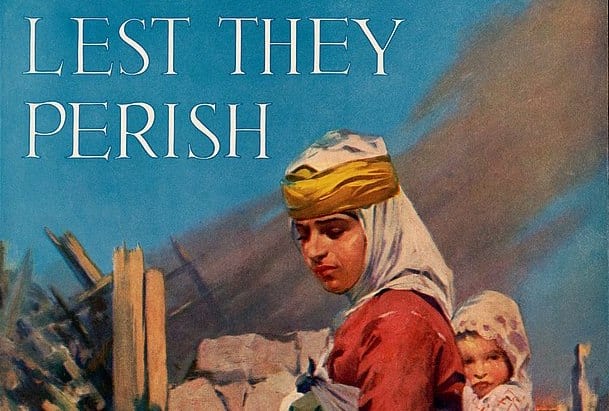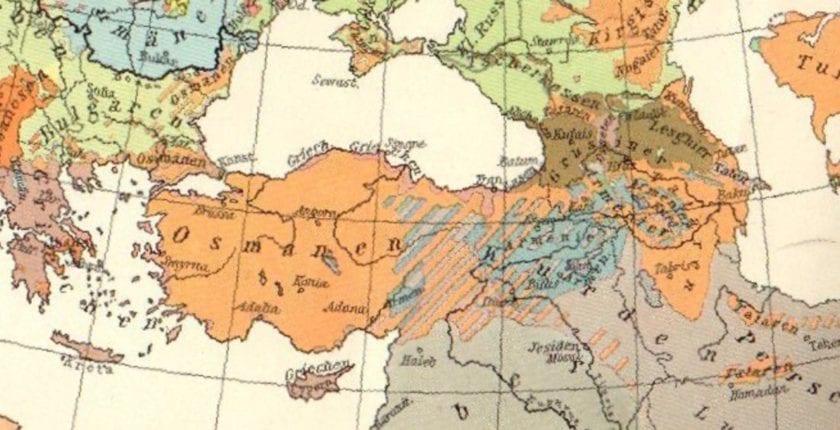
Winston Churchill and the Armenian Genocide, 1914-23
Excerpted from an article for the Hillsdale College Churchill Project, September 2020. For the complete text, an appendix of Churchill’s words on Armenia, more illustrations and endnotes, please click here.
The age-long misfortunes of the Armenian race have arisen mainly from the physical structure of their home. Upon the lofty tableland of Armenia, stretching across the base of the Asia Minor Peninsula, are imposed a series of mountain ranges having a general direction east and west. The valleys between these mountains have from time immemorial been the pathways of every invasion or counter-attack between Asia Minor in the west and Persia and Central Asia in the east…. After the rise of Russia to power, the struggle for possession of the Armenian regions, as containing the natural frontiers of their own domains, [it] was continued by Russia, Persia and the Ottoman Empire. —Winston S. Churchill, The Aftermath (1929)

The Armenian Tragedy
For nine years after the outbreak of war in 1914, Turkish governments conducted systemic genocide among the Armenian people. It was not the first assault on those who had inhabited their lands for millennia. The First World War brought further atrocities. When the Czar’s forces threw back Enver Pasha’s assault on Transcaucasia, some Armenians supported the Russians. The Ottomans said they were “traitors, saboteurs, spies, conspirators, vermin and infidels.” This incitement led directly to what its victims and their descendants describe as the Armenian holocaust.
For years the deadly comb swept back and forth through Armenian communities. Deportations to outlying parts of the Ottoman Empire began in May 1915. Armenian property was seized, men were murdered, woman and children rounded up. In the slave markets of Syria and Mesopotamia, women were sold, violated by Turkish soldiers, or left to die. Twenty-five concentration camps existed within Turkey proper. Through 1923, between one and one and one-half million Armenians died. In America, Theodore Roosevelt described the almost daily reports of murders as “the greatest crime of the war.” Up to then, he had a point. Hitler’s assault on the Jews had yet to come.
“The moral sense of Liberal Britain”
The young Churchill was aware of Armenian suffering. In 1894-96, Abdul Hamid’s Hamidian massacres killed between 100,000 and 300,000. “Whatever happens,” he wrote his mother, “it is evident that we pose as champions of humanity in general and of Armenians in particular alone and unassisted. But that is after all entirely in accordance with precedent.” The “precedent” was Prime Minister Gladstone’s outrage over an earlier pogrom in the 1870s. Speaking in 1946, Churchill recalled how “Mr. Gladstone stirred the moral sense of Liberal Britain.”
During the Second Battle of Ypres in Spring 1915, the horror of German poison gas broke upon a shocked world. It is well established that Churchill supported use of deadly gasses only after they were used by the enemy. Ypres was the tipping point. By October, reports of Armenian massacres, shootings and deportations were mounting, while at Gallipoli, few Allied prisoners were alive. Grimly, Churchill addressed the War Cabinet:
I trust that the unreasonable prejudice against the use by us of gas upon the Turks will now cease. The massacres by the Turks of Armenians and the fact that practically no British prisoners have been taken on the [Gallipoli] Peninsula, though there are many thousands of missing, should surely remove all false sentiment on this point, indulged in as it is only at the expense of our own men.
After the war, the Treaty of Sèvres guaranteed an autonomous Armenian state, though Armenians continued to suffer outside its borders. Churchill described “massacring uncounted thousands of helpless Armenians, men, women, and children together, whole districts blotted out in one administrative holocaust…beyond human redress.”
Peace to end peace
“It seemed inconceivable,” Churchill wrote, that the victors would not make their will effective” against “Armenia’s persecutors and tyrants.” So in March 1920, they offered a mandate (trusteeship) to shepherd Armenian independence. No power would take it, nor would the League of Nations. “Unsupported by men or money,” Churchill believed, the League declined “promptly and with prudence.” U.S. President Woodrow Wilson might take a mandate “if left to himself.” But an isolationist Congress blocked Wilson’s international predilections.
Churchill concluded: “The ghastly fate of the Armenians has yet to be recorded.” At the same time, he added, the victors’ attitude towards Turkey “was so harsh that Right had now changed sides.” Defeat in war was one thing. The “destruction and death of the Turkish nation” were things no Turk could countenance
Churchill’s attitude toward Turkey eased after he became War Secretary in January 1919. He found British forces stretched thin as the armies receded during demobilization. A “massacre of the Armenians” would follow withdrawal from the Caucusus. Yet Churchill wished to remove British troops from Turkey.
Repercussion and republic
Events soon tested Churchill’s instinctive sympathy for the Armenians. In September 1919 Sir Henry Wilson, Chief of the Imperial General Staff, warned him of trouble in the Caucasus:
The Armenians, feeling that we were their friends, have murdered every Turk man, woman and child they have been able to lay their hands on, and not only murdered them, but have practiced the most devilish horrors such as peeling unfortunate people alive. That such brutes as these should be saved from the vengeance of the Turks is an affair which I personally think is not our business but which the Americans or some other philanthropists might with advantage take on.
While sharing Wilson’s horror, Churchill thought of the much broader travails Armenians suffered. “We must not,” he replied, “make difficulties in small things and must facilitate any bona fide effort to stabilise the Armenian situation.”
The First Republic of Armenia, declared at Yerevan in May 1918, lasted only two years. When Yerevan fell to Turkish nationalists. Churchill wrote:
…as in Cilicia, another extensive massacre of Armenians accompanied the military operations. Even the hope that a small autonomous Armenian province might eventually be established in Cilicia under French protection was destroyed. In October France, by the Agreement of Angora, undertook to evacuate Cilicia completely. In the Treaty of Lausanne, which registered the final peace between Turkey and the Great Powers, history will search in vain for the word “Armenia.”
Hope and tragedy, 1920-23
Ever the seeker of just outcomes, Churchill’s eye fell on Mustafa Kemal Atatürk. Churchill saw in him the potential for a democratic Turkish state. Soldier, revolutionary, founding father and first president of the Republic, he was “a Captain who with all that is learned of him, ranks with the four or five outstanding figures of the cataclysm.” In 1921, Turkish forces opposing the Greeks threatened to march on British garrison at Chanak. Churchill urged “a friendly peace.” (This is incidentally the opposite of that bellicose attitude his critics say he habitually adopted.) In 1923-24, Atatürk signed the Treaty of Lausanne, which established the borders of modern Turkey.
Although Lausanne marked the end of Armenian pogroms, the country’s short-lived independence ended quickly. The Red Army advanced unopposed into Armenia in November 1920, proclaiming a Soviet Republic. Allied policy, and the paralysis of President Wilson, had thrown together two natural enemies, the Turks and Russians. The result, Churchill declared, was “a series of tragedies.”
“The ire of simple and chivalrous men and women”
Finally in 1991, seven decades after the Bolshevik invasion, Armenia seceded from the Soviet Union and regained her independence. Could things have been better, sooner? Yes, Churchill thought, but with great difficulty:
The Armenian people emerged from the Great War scattered, extirpated in many districts, and reduced through massacre, losses of war and enforced deportations adopted as an easy system of killing, by at least a third. Out of a community of about two and a half millions, three-quarters of a million men, women and children had perished….
Opinions about them differed, one school dwelling upon their sufferings and the other upon their failings…. Atrocities perpetrated upon Armenians stirred the ire of simple and chivalrous men and women spread widely about the English-speaking world.
Note
Thanks to Howard Kaloogian of the Hillsdale College Development Department, whose queries about Churchill’s views on Armenia inspired this essay.
Further reading
See Churchill’s lengthy account of Armenia’s unfortunate geographic situation, partially quoted at the top of this article, in The Aftermath, Chapter XVIII.






